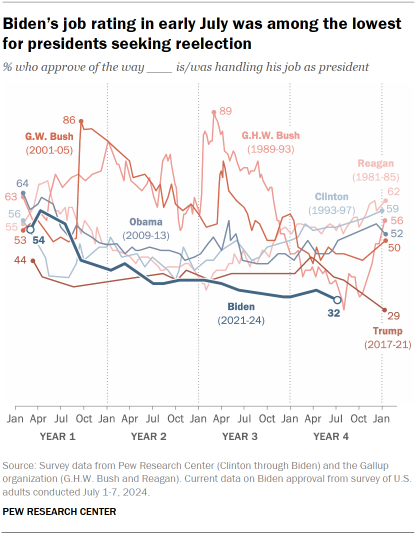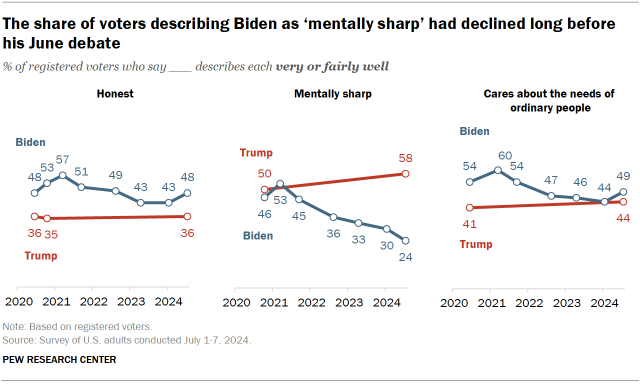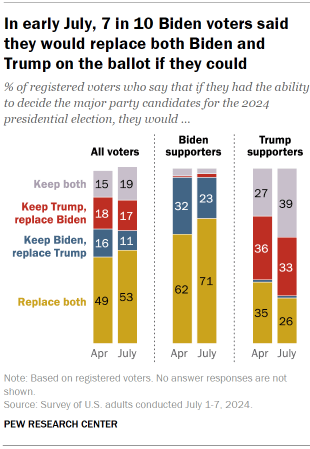
Joe Biden, Public Opinion and His Withdrawal From the 2024 Race
Joe Biden’s extraordinary decision to not pursue the Democratic nomination for president has upended the 2024 presidential race, with Vice President Kamala Harris emerging as a strong favorite for the Democratic nomination.
Here are some of the key public opinion dynamics around Biden’s choice.
Job approval

Biden’s job approval ratings have been more negative than positive since late 2021. And only about a third of Americans have approved of his performance for the last year.
But Biden’s approval rating was far higher in the early months of his presidency.
At about the 100-day mark of his presidency, Biden’s 59% job rating was on par with approval of several recent presidents. It was 20 percentage points higher than Donald Trump’s at a similar point in his presidency.
The early days of Biden’s presidency featured some notable successes, including the manufacture and rollout of the COVID-19 vaccine (which began development under the Trump administration) and passage of a $2 trillion coronavirus economic aid package.
However, the chaotic U.S. military withdrawal from Afghanistan in August 2021 proved to be a pivotal moment in Biden’s first year – and, ultimately, in his presidency.
- Only about a quarter of Americans (26%) – including fewer than half of Democrats and Democratic-leaning independents – said the administration had done an excellent or good job of handling the situation.
- This period also saw a new variant, and related surge, of COVID-19 – delaying the expected “return to normal” following the vaccine rollout earlier in the year.
Biden’s overall job approval declined 11 points, from 55% to 44%, between July and September 2021. It has never been in positive territory since then.
Confidence in Biden’s handling of issues largely followed this same trajectory.
Age and fitness
Concerns about Biden’s age and fitness to serve have been present since he ran for president in 2020.
- In August 2020, Pew Research Center asked registered voters in an open-ended question if they had any potential concerns about the candidate they supported. Nearly a third of Biden supporters named his age or health.
- In the weeks before the 2020 election, Biden was seen by more Americans as honest or compassionate than Trump was, and a larger share described him as a good role model. But Trump had a slight advantage when it came to being “mentally sharp.”
While perceptions of some of Biden’s personal traits and characteristics have changed little in the past four years, that’s not the case for his mental acuity: The share of voters who view Biden as mentally sharp declined steadily over the course of his presidency.

- In March 2021, 53% of voters said that “mentally sharp” described Biden very or fairly well. That dropped 20 percentage points over the next two years, to 33% in April 2023.
- It fell another 9 points, to 24%, following his performance in the June 27 debate.
This pattern is evident in perceptions of Biden’s other personal traits associated with his age, such as whether he is energetic. In January, only 24% of Americans described Biden as energetic, a 16-point drop from 2020.
Biden’s support has long been more about who he isn’t than who he is
Biden trailed Trump in many national surveys in the final weeks of his 2024 campaign. Those margins, including 4 percentage points in our most recent national survey, may not have boded well for the Democrat – though candidates have overcome larger deficits at this point in the race.

But among Biden’s own supporters, there were widespread concerns about his age and health – and his ability to beat Trump.
- From the outset of his 2020 campaign, much of Biden’s support has been defined not by who Biden is but by who he is not. In 2020, asked in an open-ended question why they supported Biden, a majority of his supporters said simply: “He is not Trump.”
Heading into the general election this year, the 2024 election was shaping up to be a record battle not just because of the age of the two candidates, but because of the historic size of the share of Americans who didn’t like either one of them. A quarter of Americans fell into this group of so-called “double negatives.”
As of April, nearly half of registered voters (49%) said they wanted to see both candidates replaced on the ballot – and Biden supporters (62%) were considerably more likely than Trump supporters to say this.
Following Biden’s poor showing in the June 27 debate, his own supporters’ calls for him to be replaced only increased. By early July, 71% of voters who backed Biden also said they would prefer to see both candidates replaced on the ballot.
This Pew Research Center analysis focuses on public opinion of Joe Biden as context for his decision to withdraw from the 2024 presidential election.
Most of the public opinion data in this analysis comes from Pew Research Center surveys over the course of Biden’s presidency and has been featured in recent Center reports. Links to these reports, including details about the survey methodology, are available in the text. The first chart on presidential approval includes data from the Gallup organization on Ronald Reagan and George H.W. Bush’s presidential approval ratings.
Photo: President Joe Biden talks to reporters outside the White House before boarding Marine One in January 2023. (Drew Angerer/Getty Images)